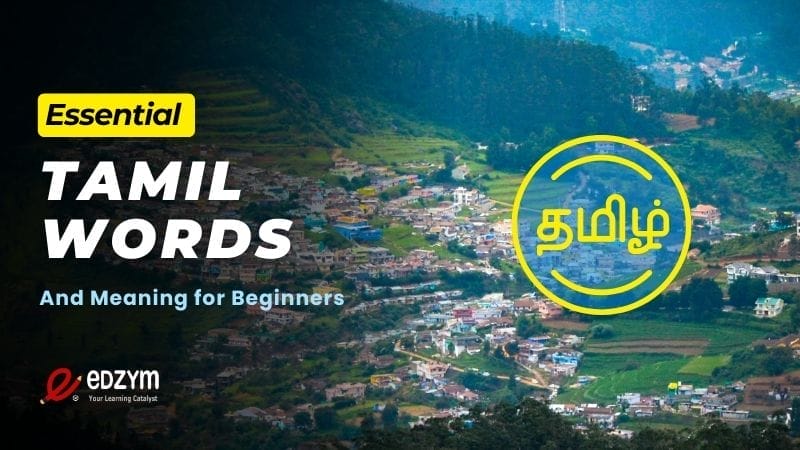Tamil Words and Meaning in English | 60+ Daily use Words
Tamil, renowned for its ancient roots and vibrant cultural heritage, stands as one of the world’s oldest classical languages. Its beautiful writing system and deep language details show a civilization that has flourished for thousands of years in South India and beyond. Understanding Tamil words —like அறிவு (arivu) meaning knowledge— and their meanings can profoundly enrich communication, especially for the English-speaking learners who love cherishing cultural diversities. This article explores the significance of Tamil words and their meanings in fostering deeper connections and cross-cultural appreciation.
Did you know?
The commonly used English words like Yoga and Curry are originated from Tamil words. Read more about such interesting facts about Tamil words in this article.
The scripts, linguistic nuances and overall the Tamil language itself have evolved over millennia, reflecting the rich cultural tapestry of the region. The geographic diversity of Tamil-speaking areas, encompassing Tamil Nadu in India, Sri Lanka, Malaysia, Singapore, and other diaspora communities, underscores its widespread cultural and linguistic influence. This linguistic heritage continues to shape identities and foster a sense of unity among Tamil speakers worldwide.
Characteristics of Tamil Words
The Tamil language is characterized by several distinct features that set it apart:
1. Phonetics and pronunciation nuances unique to Tamil: Tamil has a rich phonetic inventory, with distinct sounds and pronunciation nuances that contribute to its musicality and clarity. Vowel and consonant combinations, as well as unique phonetic rules, shape the way words are spoken and heard.
2. Types of Tamil words: Tamil words are categorized into different types, including nouns, verbs, adjectives, and more. Each type plays a crucial role in constructing meaningful sentences and conveying precise meanings in conversation and literature.
3. Influence of Dravidian languages on Tamil vocabulary: Tamil has been influenced by other Dravidian languages, contributing to its diverse vocabulary. Words borrowed from languages like Telugu, Kannada, and Malayalam enrich Tamil’s lexicon, reflecting historical interactions and cultural exchanges within the broader Dravidian language family.
These characteristics underline the linguistic richness and complexity of Tamil, making it a fascinating subject for study and exploration. Understanding these aspects enhances appreciation for Tamil’s cultural significance and its role in shaping regional identities.
Commonly Used Tamil Words in English
Tamil words have found their way into English usage across various categories, reflecting the cultural richness and diversity of Tamil-speaking communities. Here are some common categories:
Tamil Greetings and Basic Expressions:
| Tamil Script | Pronunciation | English Translation |
|---|---|---|
| வணக்கம் | vaṇakkam | Hello / Greetings |
| நல்வரவு | nalvaravu | Welcome |
| குட்பையேற்று | kuṭpaiyeṟṟu | Goodbye |
| எப்படி இருக்கிறீர்கள்? | eppaṭi irukkiṟīrkaḷ? | How are you? (informal) |
| எப்படி இருக்கிறீர்கள்? | eppaṭi irukkiṟīrkaḷ? | How are you? (formal) |
| நன்றி | naṉṟi | Thank you |
| மனம் கருங்காலம் | maṉam karuṅkālam | I’m sorry / Excuse me |
| தயவு செய்து | tayavu ceytu | Please |
| பாவம் | pāvam | Oh dear! / Poor thing! |
| சந்தோஷம் | santōṣam | Congratulations |
| வாழ்த்துக்கள் | vāḻttukkaḷ | Best wishes / Blessings |
We recommend reading our article on Tamil letters to understand the alphabets used in the table above. Additionally, consider joining our Tamil course to learn from an experienced native tutor at your convenience, following a well-structured curriculum
Daily Life and Culture Words:
| Tamil Script | Pronunciation | English Translation |
|---|---|---|
| சப்பாத் | sappāth | South Indian bread |
| வணக்கம் | vaṇakkam | Greeting (respectful salutation) |
| காப்பி | kāppi | Coffee |
| சாம்பார் | sāmbār | A type of South Indian soup or stew |
| தோசை | tōsai | South Indian crepe made from fermented rice batter |
| வத்தல் | vattal | Traditional Tamil sun-dried vegetables |
| தட்டு | taṭṭu | Basket or container |
| கையேடு | kaiyēṭu | Hand fan |
| சிலந்தி | cilanti | Traditional Tamil anklet |
| கோடை | kōṭai | Traditional Tamil headdress |

Family and Relations in Tamil:
| Tamil Script | Pronunciation | English Translation |
|---|---|---|
| அம்மா | ammā | Mother |
| அப்பா | appā | Father |
| மகன் | magan | Son |
| மகள் | maḳaḷ | Daughter |
| அண்ணன் | aṇṇaṉ | Elder brother |
| தங்கை | taṅkai | Elder sister |
| சகோதரன் | cakōtarana | Younger brother |
| சகோதரி | cakōtari | Younger sister |
| மாமா | māmā | Maternal uncle |
| மாமி | māmi | Maternal aunt |
| பாட்டி | pāṭṭi | Paternal aunt |
| சித்தப்பா | cittappā | Paternal uncle |
| குழந்தை | kuḻantai | Child |
| பெற்றோர் | peṟṟōr | Parents |
| குடும்பம் | kuḍumpam | Family |
| தந்தை | tantai | Father (formal) |
| தாய் | tāy | Mother (formal) |
Tamil Words for Nature and Environment:
| Tamil Script | Pronunciation | English Translation |
|---|---|---|
| பனி | paṉi | Water |
| மலர் | malar | Flower |
| பறவை | paṟavai | Bird |
| மரம் | maram | Tree |
| காடு | kāṭu | Forest |
| வில்லி | villi | Bow (used for archery) |
| புழு | puḻu | Frog |
| காட்டு | kāṭṭu | Rope |
| புவி | puvi | Earth or soil |
| மஞ்சள் | mañcaḷ | Turmeric |
These words with the English translations can help you start learning Tamil through English.
Emotions in Tamil Words:
| Tamil Script | Pronunciation | English Translation |
|---|---|---|
| காதல் | kādal | Love |
| சந்தேகம் | santēkam | Doubt or uncertainty |
| அழுகை | aḻukai | Sorrow or grief |
| பொறுமை | poṟumai | Modesty or humility |
| புரியாது | puriyātu | Unintelligible or not understood |
| பரிதாபம் | paritāpam | Remorse or regret |
| மகிமை | magimai | Greatness or magnificence |
| படுக்கை | paṭukkai | Suffering or hardship |
| புராணம் | purāṇam | Legend or myth |
| பதினெண் | patineṇ | Perfection or completion |
Tamil Words for Common Objects:
| Tamil Script | Pronunciation | English Translation |
|---|---|---|
| குடல் | kuḍal | Chair |
| மேடை | mēṭai | Table |
| படகு | paṭaku | Book |
| பூச்சி | pūcci | Cat |
| நாய் | nāy | Dog |
| கோட்டை | kōṭṭai | Fort |
| கட்டிடம் | kaṭṭiṭam | Building |
| மாடு | māḍu | Cow |
| ஆடு | āḍu | Goat |
| அச்சு | accu | Axe |
Tamil Technical and Academic Words:
| Tamil Script | Pronunciation | English Translation |
|---|---|---|
| அறிவு | arivu | Knowledge or wisdom |
| அறிவியல் | ariviyal | Science |
| கணிதம் | kaṇitam | Mathematics |
| விஞ்ஞானம் | viññāṉam | Wisdom or expertise |
| கல்வி | kalvi | Education or learning |
| அறிவியல் | ariviyal | Physics or natural science |
| பொருள் | poruḷ | Meaning or significance |
| முதல் | mudhal | First or primary |
| நிலை | nilai | State or condition |
These Tamil words not only enrich the English language but also highlight the cultural and linguistic contributions of Tamil-speaking communities worldwide. Understanding their meanings enhances cross-cultural communication and appreciation of Tamil heritage.
If you would like to understand the Tamil number system, check out our article on the Tamil numbers.
Examples of Tamil words that have enriched global languages
- Curry: The term “curry” derives from the Tamil word “கறி (kaṟi),” meaning sauce or gravy. It has become a staple in global cuisine, representing a variety of spiced dishes.
- Yoga: The word “yoga” comes from the Tamil word “யோகம் (yōkam),” which means union or connection. It refers to spiritual practices that have gained worldwide popularity for their physical and mental health benefits.
- Mango: The English word “mango” is derived from the Tamil word “மாங்காய் (māṅkāy),” which refers to the fruit.
- Catamaran: A type of boat or vessel with two parallel hulls, the word “catamaran” comes from the Tamil word “கட்டுமரம் (kaṭṭumaṟam),” which means tied wood.
- Pundit: Refers to an expert or scholar, often used in academic contexts. It originates from the Tamil word “பண்டிட் (paṇṭiṭ),” meaning learned person or teacher.
- Corundum: A mineral, including rubies and sapphires, the term “corundum” is derived from the Tamil word “குருவம் (kuruvam)” or “குருவார் (kuruvār),” meaning ruby.
- Veranda: A roofed platform along the outside of a house, the word “veranda” is derived from the Tamil word “வரண்டம் (varaṇṭam),” which means a surrounding.
- Cash: The term “cash” for money is derived from the Tamil word “காசு (kācu),” which means money or coin.
- Candy: The word “candy,” referring to sweets or confectionery, is derived from the Tamil word “கண்டி (kaṇṭi),” meaning lump of sugar.
- Teak: A type of tropical hardwood tree, “teak” comes from the Tamil word “தேக்கு (tēkku).”
- Tamil: No wonder, the name of the language itself, “Tamil,” is derived from the Tamil word “தமிழ் (tamiḻ).”
These examples highlight the linguistic and cultural influence of Tamil across different parts of the world, demonstrating how Tamil words have integrated into global languages and enriched vocabulary through trade, colonization, and cultural exchanges.
Resources for Learning Tamil
Exploring structured lessons with a native tutor can significantly enhance your proficiency in Tamil beyond basic vocabulary. At Edzym, we offer comprehensive courses to learn Tamil tailored for all levels, from beginners to advanced fluency. Learn at your convenience with experienced native Tamil tutors who provide personalized guidance.
Continuing with a Native Tutor:
- Personalized Learning: Tailored lessons with native Tamil tutors ensure your specific learning needs are met.
- Structured Curriculum: Progress through a well-designed curriculum from beginner to advanced levels.
- Accountability: Regular assessments and feedback sessions keep you on track towards language proficiency.
- Cultural Insights: Gain deeper cultural understanding through language immersion and tutor insights into colloquial expressions, correct pronunciation, and cultural contexts.
By leveraging these resources and engaging with native speakers, you can deepen your proficiency in Tamil while gaining a richer understanding of its cultural significance. Embrace the journey of language learning as a pathway to connecting with Tamil heritage and fostering cross-cultural appreciation.
Experience Our Commitment:
We offer a free session to experience our structured approach firsthand. Book below to schedule your free class and start your journey to mastering Tamil with confidence.









